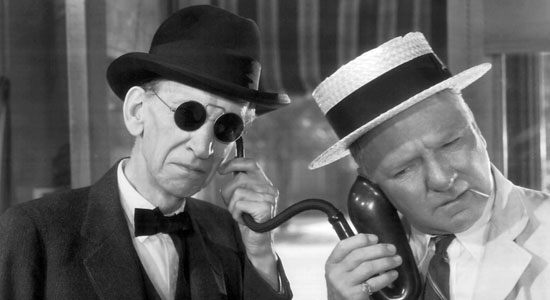MAGNET contributing editor Jud Cost is sharing some of the wealth of classic films he’s been lucky enough to see over the past 40 years. Trolling the backwaters of cinema, he has worked up a list of more than 100 titles—from the ’30s through the ’70s—that you may have missed. A new selection, all currently available on DVD, appears every Friday.

It’s A Gift (1934, 68 minutes)
It’s A Gift is really little more than a series of hilarious set pieces from the brilliant comic mind of W.C. Fields. More measured in pace than the zany antics of the Marx Brothers, Fields’ best screen moments are slow-burners, featuring routines perfected in his early days as a vaudeville comedian/juggler. Unlike the self-inflicted predicaments of Larry David in Curb Your Enthusiam, Fields is seldom the author of his own misfortune. Instead, he’s trapped in a marriage to a shrewish wife (Amelia, played to the hilt here by Kathleen Howard) with rude children. Fields’ only defense is his understated, Midwestern monotone, martini-dry with sarcasm.
Fields as Harold Bissonette (pronounced “Beesonay,” insists Amelia) runs a corner grocery in New Jersey but dreams of owning an orange grove in sunny California. He’s constantly tripping over roller skates left on the stairs by his young son, Norman (Tom Bupp). “What’s the matter, Pop, don’t you love me anymore?” asks Norman over breakfast. Amelia is aghast when Harold attempts to smack the kid. “Well, he’s not gonna tell me I don’t love him,” mutters Harold.
In one of the great comic scenes ever, Bissonette screams at his oafish shop assistant, “Open the door for Mr. Muckle, the blind man!” Too late. Mr. Muckle (Charles Sellon) has already put his cane through the grocery store’s glass front door. “You got that door closed again, huh?” says Muckle as he teeters precariously, swinging his cane over a huge pile of unwrapped light bulbs.
Trying to escape his nagging wife in the wee hours to get some shut-eye, Bissonette takes refuge outside on a rickety, second-floor porch-swing. “Sweet repose,” he murmurs as the milkman arrives in squeaky shoes, rattling his bottles and dropping off a coconut at the apartment upstairs. The runaway Hawaiian delicacy then bounces noisily down the wooden steps, punctuated on each floor by crashing into a garbage can.
Next up is an insurance salesman (T. Ray Barnes) who shouts out at the drowsy Bissonette: “Do you know a man named Carl LaFong? Large L, small A, large F, small O, small N, small G. I hear he’s interested in an annuity policy.” The eager salesman climbs the stairs to peddle life insurance to Bissonette. “For five dollars a month, you can retire when you’re 90,” he says. An exasperated Bissonette chases the salesman downstairs with a meat cleaver, mumbling, “I suppose if I lived to be 200, I’d get a velocipede.”
Loaded down with their worldly possessions, the Bissonettes are soon motoring through Depression-era America to a new life on a California orange ranch, purchased sight-unseen by Harold with an inheritance from his Uncle Bean. What could possibly go wrong with such a carefully calculated change in lifestyle?






